Don’t Sleep On This Value Proposition
The Nissan Leaf was the world’s best-selling electric vehicle from when it was introduced in 2011, until it was recently passed by the Tesla Model 3 and Model Y. The significance is the Leaf has withstood the recent onslaught of electric vehicles hitting the market, meaning its 700,000 owners found a vehicle that met their needs.
Nissan offers two versions of the 2024 Leaf, the S and SV Plus, the latter of which we drove recently through Southern California. The standard Leaf S has a 149-mile all-electric range (AER) with a 40 kWh battery and a 110 kW electric motor producing the equivalent of 147 horsepower (hp) and 236 pound-feet (lb.-ft.) of torque.
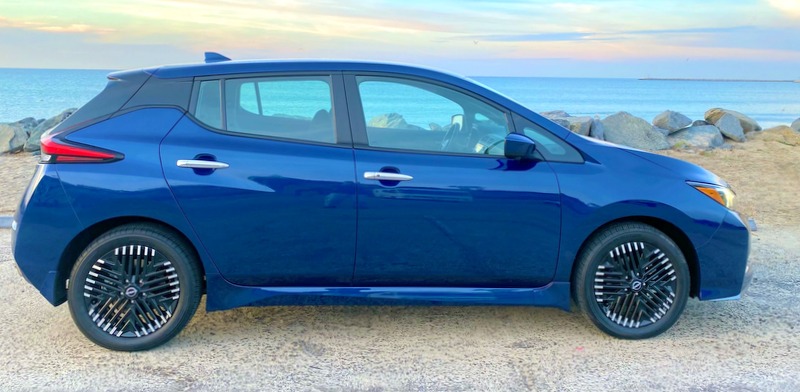
The Leaf Plus: More Power, More Range
The 2024 Nissan Leaf SV Plus, with a 160 kWh (214 hp and 250 lb.-ft. of torque) electric motor, delivers a 45% increase compared to the standard Leaf. The torque is delivered across a wide band, making for spirited launches. With no wheel spin, the smooth and effortless linear acceleration gets the Leaf SV Plus from 0-60 in about 6.7 seconds. Not head-snapping, but certainly a rewarding sensation which only an electric car can provide, and plenty fast enough to merge into freeway traffic. There are plenty of EVs that can go twice as quickly off the line, but plan on spending about twice as much as the Leaf Plus.
The Environmental Protection Agency (EPA) rates the 2024 Leaf SV Plus at 212 miles AER. By today’s standards this range is on the low side, but before thinking it is too low, ask yourself how many miles you drive daily? If, like most people, you are driving under 50 miles daily, this efficient car should be on your consideration list.
Charging
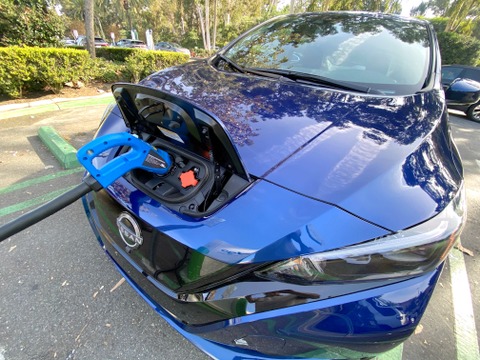
Charging is through plugging-in and regenerative braking.
There are three plug-in options for charging the Leaf SV Plus. From a nearly empty battery, times will be:
- Level 1 (120V) – 20 hours
- Level 2 (240V) – 11 hours
- Level 3 (DC Fast Charging) – 80% in 60 minutes
The Leaf used the CHAdeMO charger, which has fallen by the wayside, usurped by the more popular Tesla NACS system and the one favored by most non-Tesla EVs, CCS. Many CCS chargers have CHAdeMO plugs available and there are adapters as well, but finding public fast-charging will be more of a challenge than with competitive vehicles.
On the Road
Light in its feel, nimble and responsive, the Leaf is certainly not a sporty car, but one that easily handles all but the most challenging road conditions. The steering offered neutral road feedback with flat cornering thanks to the heavy components such as the battery, being placed under the floorboard in the center of the body. This directional stability enables smooth cornering with a low center of gravity. Replace the 215/50/17-inch Michelin Primacy Energy Saver tires with something stickier, and the handling would improve. But again, there is that trade-off of performance versus the all-electric driving range. If you buy and drive the Leaf SV Plus for how it was designed, expect to be grateful for the latter.
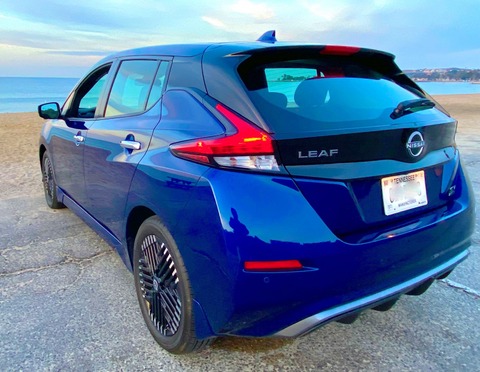
There are two driving modes—Normal and Eco. Normal is the default, and for a good reason as it is recommended for all driving situations. Logically, there should be an increase in efficiency and range when in Eco mode, but when we tried it in-town, the acceleration was lackluster. At freeway speeds the noticeable reduction in power made us uncomfortable in the case of an emergency. You can experiment with it, and it may suit your driving style.
Nissan has a unique way to engage the one pedal driving, or E-Pedal, that reduces the need to switch between the accelerator and brake pedals. After setting the system, acceleration, deceleration, stopping and holding at a stop are all controlled by the pressure applied to the accelerator pedal.
With no steering wheel-mounted paddles to increase or decrease the regenerative braking or motor slowing, as is common on most electric vehicles, there is an E-Pedal switch on the center console. Pulling back on it once sets the braking to begin fairly aggressively, which in-time will bring the car to a stop and hold it there until accelerating again. Pulling back a second time resets to no regenerative braking. It was a short learning curve getting comfortable with how and when to use the E-Pedal switch for slowing and stopping without needing to step on the brake pedal.
The second way to slow down without touching the brake pedal is dropping the transmission into the ‘B’ setting, which stands for braking. This slows the Leaf SV Plus to a point the E-Pedal switch can be engaged, leading to a full stop and hold.
So why go to all the trouble of tugging on the ‘B’ shifter and flicking the E-Pedal switch when it could just as easily be left in the ‘D’ drive setting and use the brake pedal? For us, this was the best way to efficiently drive the Leaf SV Plus, increasing the battery charge by converting kinetic energy into electric energy that is then stored in the battery.
Driver Technology Advancements
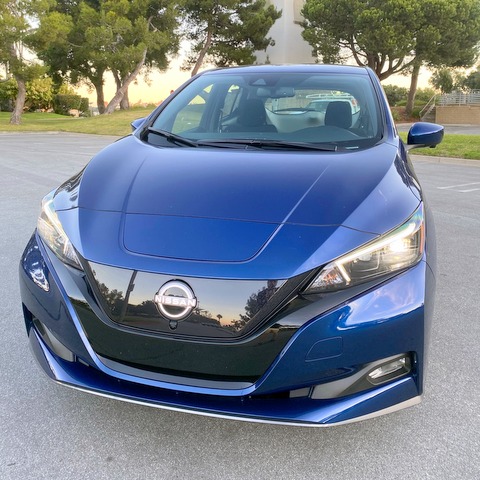
Nissan has developed advanced driver assist systems (ADAS). Two of the technologies on the Leaf SV Plus are ProPilot Assist and the forementioned E-Pedal. Nissan calls this Intelligent Mobility.
Nissan stresses that ProPilot Assist is not autopilot, which no car company has, including the one that fled California for Texas. ProPilot Assist is a hands-on system. When engaged, it aids the driver, keeping the Leaf centered between lane lines and at a safe following distance from other cars. ProPilot Assist has the ability to help a sleepy or physically incapacitated driver safely bring the Leaf to a stop, which is why, after a quick 10 seconds, a series of flashing lights and then sounds increasing in volume, remind the driver to put their hands back on the wheel.
Other ADAS on the Leaf SV Plus include automatic emergency braking with pedestrian detection, lane departure and blind spot warning, rear automatic braking, rear cross traffic alert, and a surround view monitor.
Leaf Plus Design
The complete 2018 redesign, which is carried over to the 2024 Leaf Plus, brought more contemporary styling. The aerodynamic LED head and daytime running lights smoothly blend into the fenders, sitting wide outside of the very recognizable signature V-Motion grille that also incorporates the charge door. The floating roofline, gently sweeping to the rear hatch, includes a small spoiler over the rear glass creates an aerodynamic silhouette, resulting in a 0.28 coefficient of drag. While still recognizable as a Leaf, it does not scream “I am different!” but softly says “Hey, check me out.”
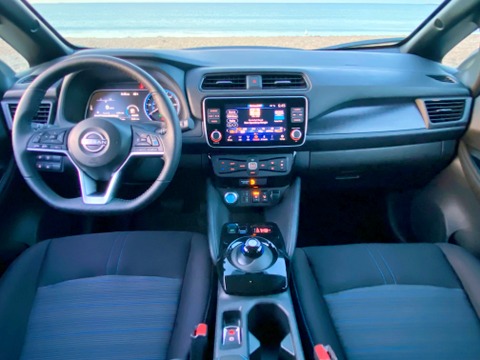
The interior is driver-friendly with easy-to-read gauges providing everything well within the driver’s outstretched arm, including the volume and channel knobs for the 6-speaker sound system. NissanConnect allows the driver to stay connected throughthe 8-inch color touchscreen, which houses the navigation, voice recognition and AM/FM/SiriusXM with Apple CarPlay and Android Auto. There are four USB ports, two front and two rear, with Siri EyesFree and Bluetooth hands-free phone interface with text messaging.
The Leaf SV Plus seats were comfortable and supportive, with ample leg and headroom. The driver gets 8-way power adjustments with 2-way lumbar, and the front passenger 4-way manual adjustments. The rear seat comfortably holds two adults, splits 60:40 and folds flat, offering 30 cubic feet of storage space.
Model Line-up
The 2024 Nissan Leaf comes in two trim levels. The base MSRPs for the two, including the mandatory $1,095 destination charge are:
- Leaf S – $29,235
- Leaf SV Plus – $37,285
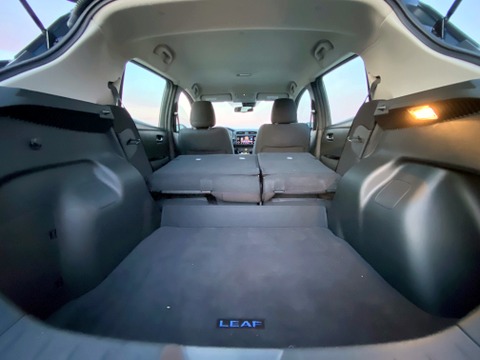
The Leaf SV Plus Clean Fleet Report tested had a final price of $37,815 that included $530 in options (splash guards and carpeted floor mats).
Depending where you live and your taxable income, you could reduce your final cost through federal, state, and utility company programs. Contact your tax advisor before considering a Leaf purchase so you are completely clear on the tax credits and rebates. Not relying on the dealer to provide this information will serve them and you best.
For those in California, the Leaf qualifies some purchasers for the coveted HOV sticker, which allows driving in the carpool lane, even with just the driver. If you haven’t heard the stories, people buy the Leaf just for this benefit.
Observations: 2024 Nissan Leaf SV Plus
The base 2024 Leaf SV Plus coming in at under $30,000 (after available tax credits or rebates) is one of the best electric vehicle bargains on the market. The standard Leaf S could cost even less to drive off the dealer lot. Even when highly optioned like our SV Plus model, it still ranks among the best values for the money you can get when it comes to an all-electric sedan.
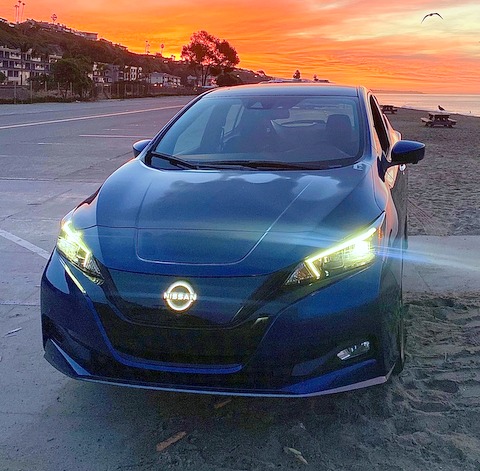
Clean Fleet Report suggests if you need a very reasonably priced, value-oriented EV, and can live with 212 miles of all-electric driving range, now is the time to visit your Nissan dealer. We guarantee they will be pleased to see you.
There is big news coming from Nissan regarding the next generation Leaf, projected to be on-sale in North America in 2025. The current Leaf is built in Nissan’s Smyrna, Tennessee, manufacturing facility, but beginning in 2025 Leaf production will come from a new plant in Sunderland, England, the United Kingdom.
These three new electric vehicles are anticipated to be coming from the Sunderland Plant.
- Nissan Qashqai – the original crossover and the UK’s best-selling car of 2022
- Nissan Juke – compact crossover which has sold more than one million units
- Nissan Leaf – the world’s first mass-market EV
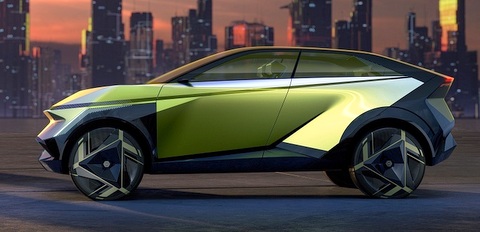
These future models are inspired by all-electric concept models, two of which were recently unveiled at the 2023 Japan Mobility Show.
- The Nissan Hyper Urban Concept, a crossover EV characterized by a sleek and modern design
- The Nissan Hyper Punk Concept, a compact crossover with an exterior defined by multifaceted and polygonal surfaces
- The Nissan Chill-Out Concept, first unveiled in 2021 and rumored as the inspiration for the third generation Leaf
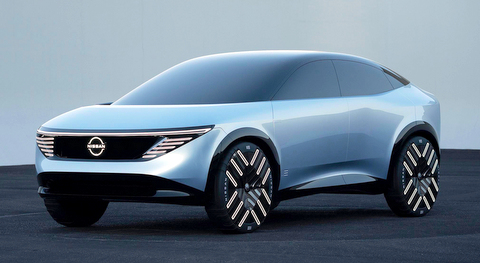
The ramifications for American Nissan dealers and their customers will be significant. The new Leaf will not qualify (using January 2024 rules and regulations) for federal and state tax rebates or credits, which will make it a tough sell in an increasingly competitive EV market. Even though the Leaf was a trailblazer and has been on-sale longer than any other EV, Nissan didn’t modernize and improve the Leaf quickly enough, and it no longer was a go-to EV as others went further, charged faster and had more modern designs.
The 2024 Nissan Leaf SV Plus we drove is a fine car. Don’t let it go away before taking a close look at what you get for your money.
Make sure to opt-in to the Clean Fleet Report newsletter (top right of page) to be notified of all new stories and vehicle reviews.
Story by John Faulkner. Photos by John Faulkner and Nissan.
We’ve been following the Leaf a long time:
Road Trip: 2020 Nissan Leaf
Road Test: 2019 Nissan Leaf Plus
Personal: 2019 Nissan Leaf vs. 2019 Kia Niro on Storage Space
Road Test: 2018 Nissan Leaf
Exclusive: Documents from Nissan Leaf Battry Software Upgrade
Comparison Test: 2018 Chevy Bolt vs. 2018 Nissan Leaf
News: Second Generation Nissan Leaf Introduced
Road Test: 2016 Nissan Leaf
Feature: Life with Leaf, a Cost-Benefit Analysis
Road Test: 2013 Nissan Leaf
Comparison Test: Nissan Leaf vs. Mitsubishi iMiEV
News: Nissan Leaf Is First EV to Earn 5-Star Safety Rating
News: Nissan Leaf Wins World Car of the Year
News: Nissan Leaf EV Attracts 100,000 Potential Buyers
News: Nissan Leaf EV Will Start at $32,780

2 thoughts on “Road Test: 2024 Nissan Leaf SV Plus EV”